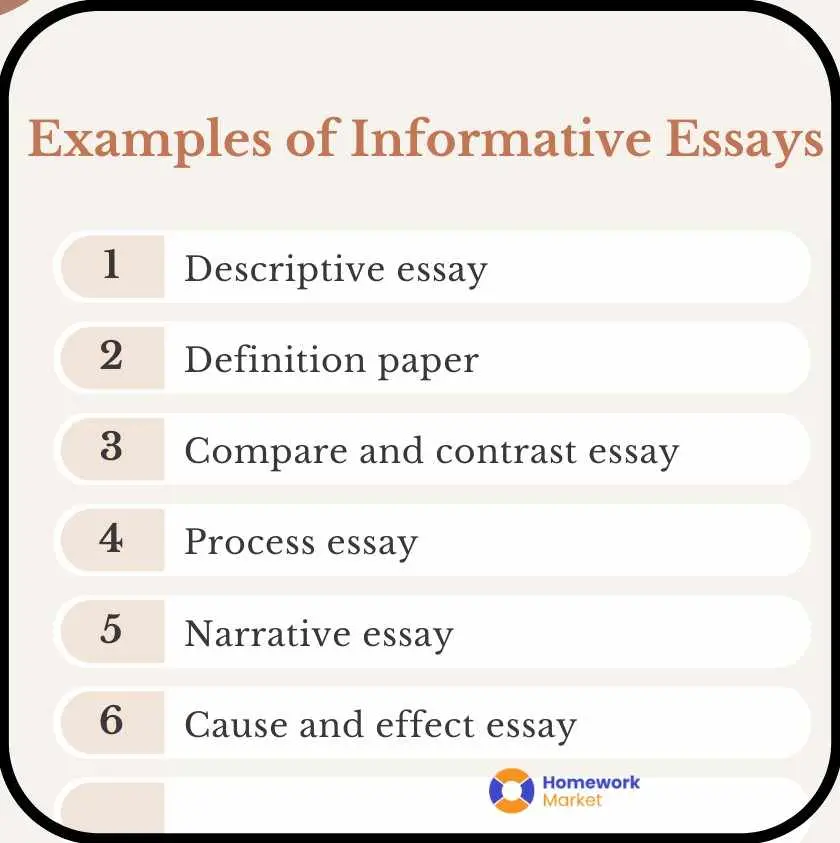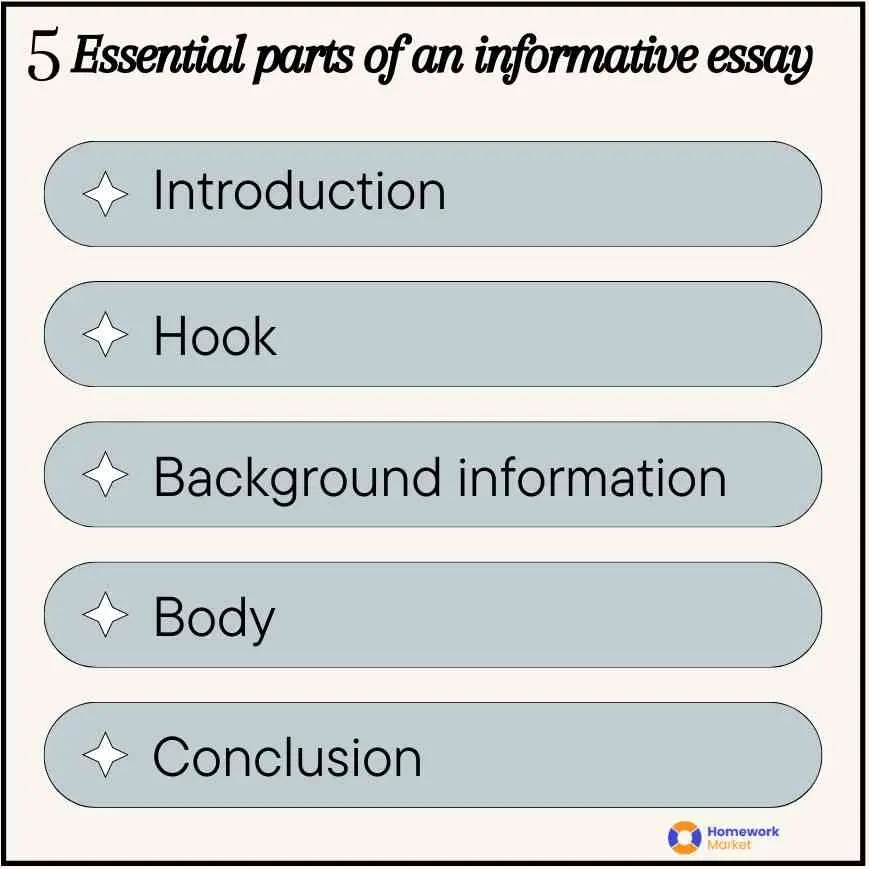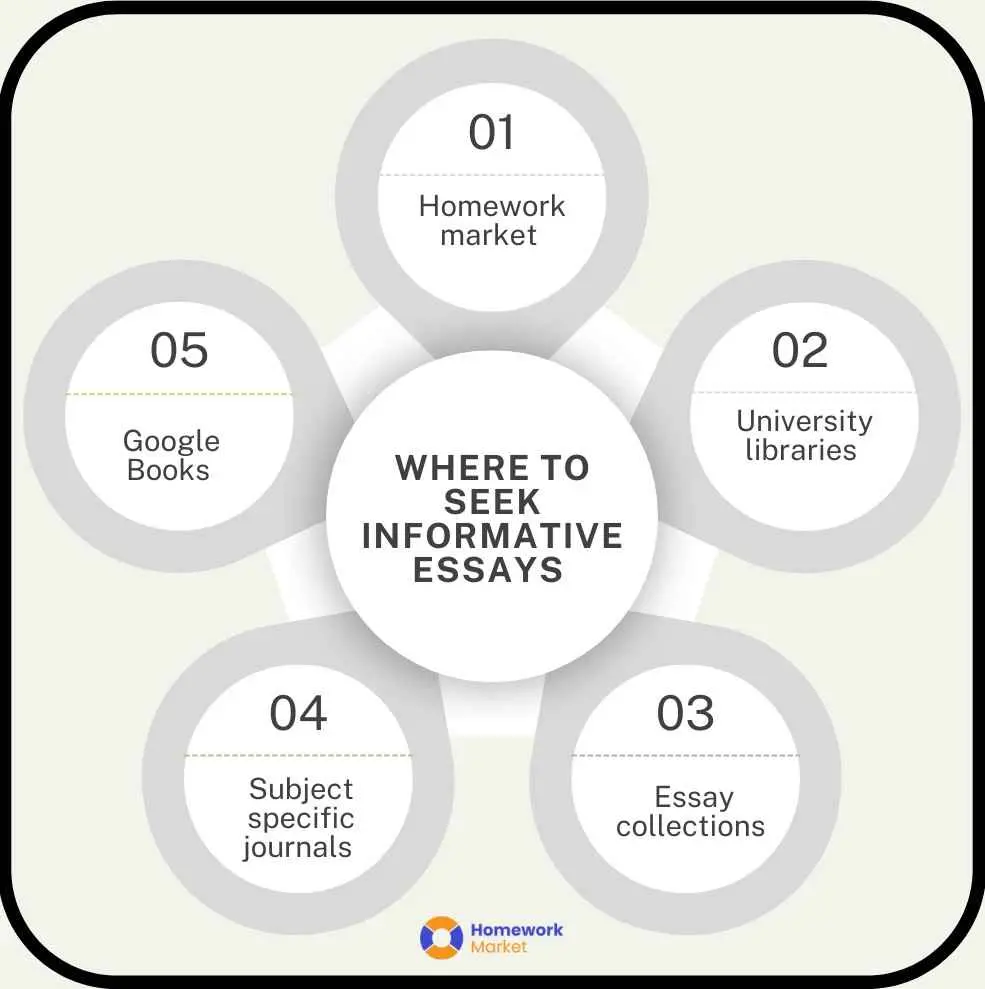Master the Art of Informative Essay Writing: A Complete Step-by-Step Guide

Updated:
13 mins read
It's on Friday evening after classes, and after checking your homework diary, you spot an informative essay due on Monday. It's a shock for you, right? We understand that essay writing isn't easy for students, especially informative.
But you know what? If you learn the writing process, it becomes easy. That's why we have compiled this guide with you in mind so that we can solve the essay writing dilemma. In case time catches with you, our essay experts are available 24/7 and will write the essay for you as you learn.
Deal? Be sure to stick to the end and grasp nuggets from our experts on how to write an informative essay.
What is an Informative Essay?
This paper is as simple as the name sounds. An informative essay educates your audience on a specific topic. As you write the essay, you must be familiar with the subject to gather quality facts. You should organize the essay content well to achieve the objective of educating your readers.
Sometimes, people refer to informative as expository essays because both aim to inform the audience. So don't get confused when asked to write an informative/expository. They all have the same structure and one aim, as we will expound later.

To clarify, an informative article aims to answer the following questions: who, what, where, when, how, and why. In simple terms, this essay can take different formats depending on the title. So, your essay can include any of the following:
- A descriptive essay aims to illustrate the image of an event, situation, place, or someone. If you attend a wedding ceremony and want to explain the event to those absent, you should write a descriptive essay. Inform the reader about the wedding, where it was, who was present, and what happened.
- The definition paper aims to give the meaning of certain concepts. This essay answers what question. For example, what is osmosis? It requires you to define the word osmosis.
- The compare and contrast essay discusses the similarities and differences between specific ideas. This informative writing aims to offer clarifications to the readers for different concepts.
- Process essay answers the question of how. It's mostly an article that gives a procedure for doing something. To illustrate, you may have a task on "how to write a thesis statement," you should write all direct steps on how to write it.
- A narrative essay tells a story about your experience of an event or situation.
- The cause-and-effect essay explains what led to a particular situation, the results, and the leading factors.
What are the Steps for Writing an Informative Essay?
Informative essays require simple writing steps, just like other articles. We've compiled a list of guidelines that will help you organize your essay and communicate effectively.
- Pick a winning essay topic.
- Research and gather topic details
- Take notes and keep track of the sources
- Brainstorm the ideas and create an informative essay outline
- Write the essay
- Proofread and edit
- Review
Pick a Winning Essay Title
Learners find it challenging to choose an essay title, especially when there is a list of informative essay topics. This topic selection task may seem easy, but it can impact the quality of your essay. So, to ensure you write an excellent paper, follow these simple tips in choosing an informative essay topic:
- Settle on a specific topic. A very broad or narrow topic will create issues when researching content.
- Choose an exciting topic to write about, as this will keep your audience intrigued to read.
- Ensure the subject has credible sources of information like Good books and educational websites for quality purposes.
Research and Gather Topic Details
Remember, an informative paper requires facts about the topic. Therefore, you must thoroughly research, explore the subject, and gather all the relevant details. Use quality content sources, as we have explained above; you don't want to misinform your audience. For instance, you should be keen on statistics to give the most recent and accurate figures.
Take Notes and Keep Track of the Sources
As you read the source, you should keep your eyes on the look for facts, quotes, and examples that may be useful for your topic. So, have a note or software that you can use to record these details. You can use EndNote for this.
Again, write down the ideas that come into your mind as you read the notes. You can write them as an analysis of what you have learned or different concepts that may add some weight to your text.
Brainstorm the Ideas and Create an Essay Outline
After reading and gathering all the needed materials, take some time to reflect on the content and structure. You can create a mind map of what you think about the topic. Also, keep in mind the organization of the content; for example, if it's historical or procedure content, follow a chronological order.
A mind map doesn't have to be complicated. You can just list the ideas as you want them to appear in the essay. Check out this article to gather more insights on this procedure.
Finally, don't forget to draft the essay outline. Think of what to write in the informative essay introduction by highlighting the points, the body, and the conclusion.
Write Your Essay
The next important section is writing your paper. It's a moment to combine all the concepts you have learned about this topic. Be sure to write freely from your head to avoid copy-pasting what others have written. If you are struggling to write down the essay, it means you need to read more to gather ideas.
academic performance and reach your goals
See how quick and easy it is to get an exceptional essay with minimal effort on our platform.

Writing is the easiest stage if you have followed all the other steps. We can compare it to the construction of the house; if you already have the house design, materials, and labor, building becomes easier. It's just a matter of following the design and using the correct proportions of the materials.
It's best to start writing your body section and then end with the introductory and conclusion paragraphs.
So, since we have given you the writing plan, follow it to the letter, and you will make it to this step.
Are we okay?
We are almost winding up the informative essay-writing procedure -two more steps to go.
Proofread and Edit Your Essay
When you complete your first draft, take a break to have a fresh mind. Then, proofread your paper as you check for flow, clarity, and coherence. Check if the text makes sense to the reader and supports the thesis statement.
Are the paragraphs easy to read? They should have short sentences and still communicate. Is there a smooth transition between them?
Don't forget to check on grammar, punctuation, and formatting so your paper sounds professional.
Final Review
Before you submit that essay, there is no harm in doing a final review. Check if any errors are remaining, and if possible, you can ask a colleague or family member to read it. Also, review all the assignment instructions and confirm that you have applied them.
What are the five Essential Parts of an Informative Essay?

When writing your essay, you must have come across the three main parts: beginning, middle, and end. These sections form the five elements of an informative essay that we'll discuss.
1. The Introduction
Treat your introduction like the journalism lead, ensuring the essay has an attention-grabbing opening. To achieve this, an informative essay introduction should have the following:
- Hook – one or two statements that keep the readers glued to your essay and want to read more. You use a fact, a statistic, a personal anecdote, or an interesting information.
- Background information – gives the main idea, defines some terms, and describes what will be covered in the paper. Remember you should include all these depending on the essay topic. So, if you don't need to define terms, just ignore that. The necessary elements are the main points and what is to be covered in the article.
- The thesis statement - determines the angle or focus of your essay. The thesis statement should be clear and show the direction of your paper. Remember, this is an informative essay, so don't include your opinion like in argumentative or persuasive papers. Your thesis statement should be based on fact.
- I believe you can now write an introductory paragraph with ease. If you require some guidance, our essay writers have informative essay introduction examples to guide you.
2. The Body Section
The body should contain all the key concepts of the research. You can have at most three paragraphs for an informative essay unless advised otherwise. As we defined, an informative essay is based on facts; thus, you don't need many details or a longer essay.
Each body paragraph should have four elements: topic sentence, evidence, discussion, and transition. The topic sentence contains the theme for the paragraph, and it should just be one. Match your paragraph theme with supportive ideas or evidence.
Later on, you should discuss the claim in just one or two sentences. Finally, write a transition sentence to the next paragraph. All these sentences should come out naturally and show coherence for the readers to understand.
Following this scheme to draft your body paragraphs, you will have a quality essay. Your teachers and readers will surely like it.
3. Informative Essay Conclusion
You are almost done with your essay now. This is just a walkover if you have written the other sections well. So, the end of your paper should also be exciting and communicate. Focus on highlighting the significant ideas you have discussed in the body in just a few lines.
Also, restate the thesis statements in different words to remind the audience of the main focus. Ultimately, create a memorable statement that will leave the reader pondering it. This can be a question, a quote related to the topic, or a fact you want to emphasize.
Here comes to the end of your essay. Happy? I hope you can write the paper independently by applying the above plan. But, if you require clarification, please seek our college essay writing services.
What are the Features and Examples of Informative Essays?
To ensure that your essay informs the readers, it should have the following characteristics:
- An objective and neutral tone. As a writer, you should focus on presenting facts rather than personal bias.
- Well-organized in structure. The format of this essay should have an introduction, body, and summary section that serves a specific purpose.
- A strong thesis statement highlights the topic and the critical points of discussion. If you find yourself struggling to create a clear thesis statement, we have a guide for you.
- Use quality content and supporting evidence such as examples, data, facts, etc.
- Use clear and precise language for your informative writing to reach a wider audience.
- Incorporate a variety of sources in the essay, like articles, books, expert interviews, and websites.
- Ensure your essay has a proper transition and flow within paragraphs. Use appropriate phrases to show addition, cause, contrast, etc.
- Ensure the introduction and conclusions are engaging by applying the techniques suggested above in each section.
Some of the examples of informative essays that we have include:
Where Can You Seek Informative Essays?

If you need to buy an informative essay for learning purposes, consider the following sources:
- Online writing platforms like Homework Market exist. There are many writing platforms, and you may wonder why you should choose us. Our sample informative essay speaks volumes. For instance, we have an essay example: why do we celebrate Thanksgiving?
- University libraries, since most share access to different essays and research papers.
- Essay collections and anthologies. These collections publish various topics on essays that you can access for learning.
- Subject-specific journals that offer research articles and essays relevant to your focus.
- Google Books offers previewable informative essays.
To Wrap Up
Imagine the satisfaction of seeing your classmates nod in understanding as you share your insights. This is the same experience you will encounter when you apply the tips above for writing your academic paper.
Use the writing ideas that you have gathered and your writing art to make your essay engaging. If you can't get it right within the first draft, keep practicing the writing art.
In the event that you need support writing an informative essay, we are just a click away. Request for our paper writing services, and we will assist you.
Frequently Asked Questions
1. How should you structure your informative essay?
Your essay format should have the following:
- Introduction paragraph with a hook, background information, and thesis statement
- Body paragraphs, each with claim, evidence, and explanations
- Essay summary with a restated thesis and a final thought
2. How long should an essay be?
An informative essay can be 500 to 2000 words long. However, some papers can also be longer based on requirements. For expert guidance on essay length, check out this blog.
3. Which are the best phrases to use in informative essays?
- Research shows
- In other words
- To summarize
- On the other hand
4. How can I make my informative essay interesting?
- Creating an engaging hook in the introduction to capture the reader's attention
- Use specific informative essay examples and relevant data in the essay
- Breaking down complex concepts into smile terms
- Using active voice
5. Why should I write an essay outline?
- An outline serves as a roadmap for your essay
- It helps you stay focused on the topic
- Saves time during the writing process
Prices start at $12.99 per page (275 words) for writing and $8.5 for editing and proofreading.
- MONEY BACKGUARANTEED
- NO HIDDENCHARGES












